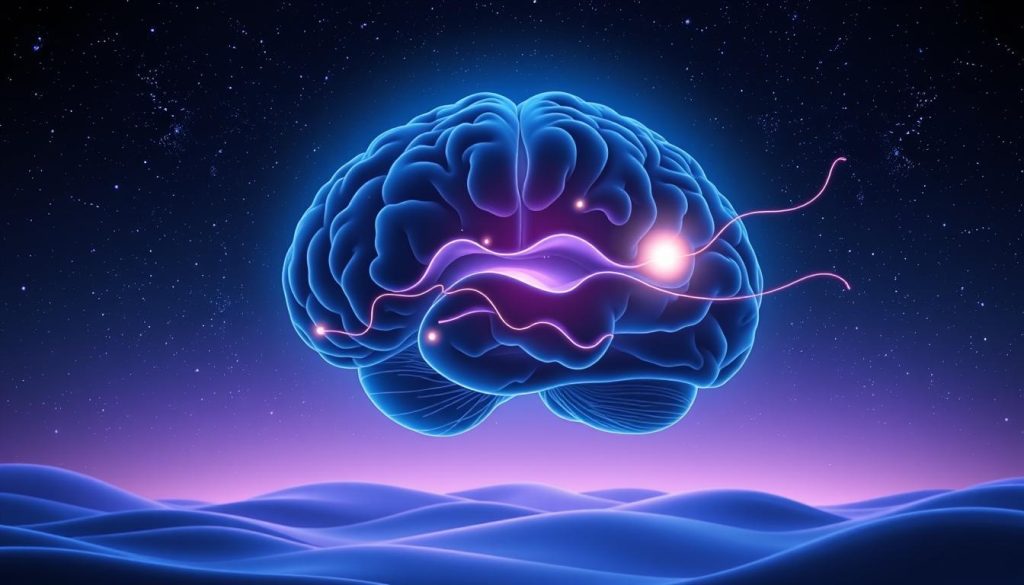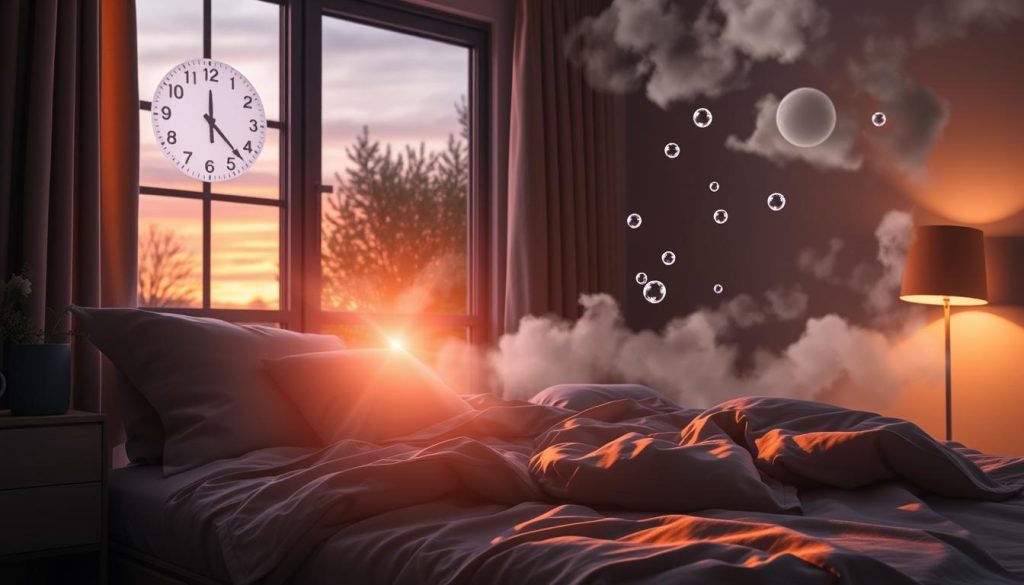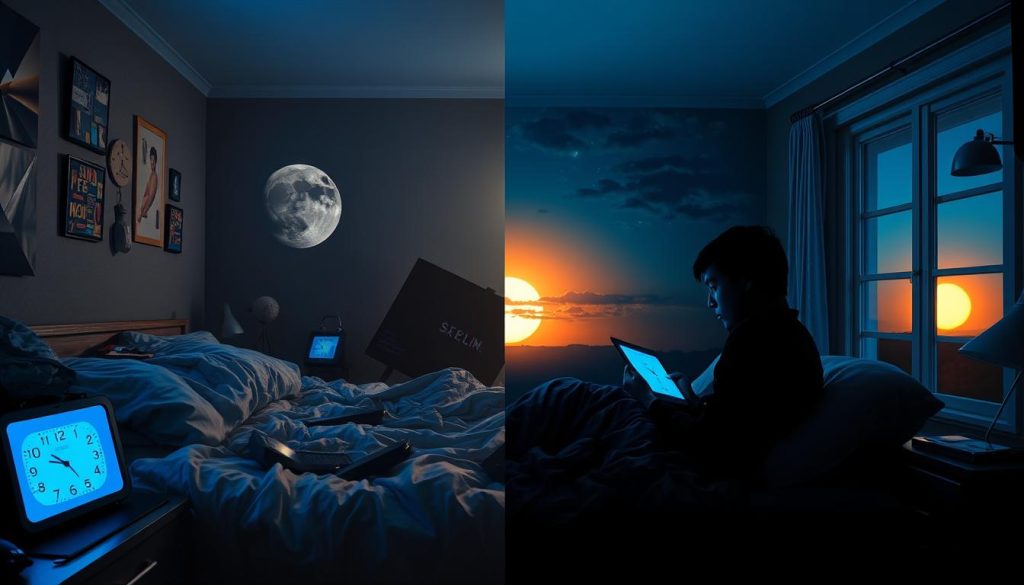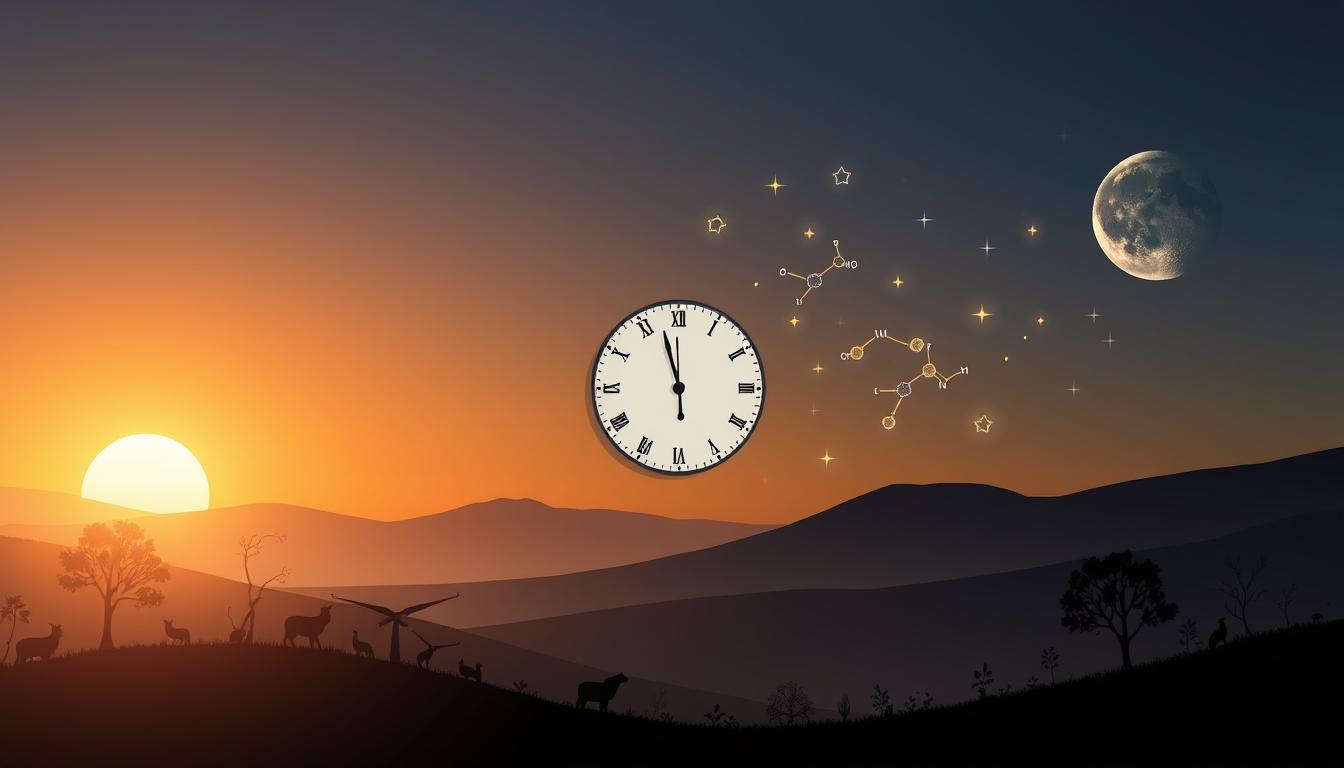I’ve always been fascinated by sleep and its impact on our lives. The body’s internal clock, or circadian rhythm, controls many processes in a 24-hour cycle. This affects how well we sleep and our overall health.
Melatonin, the sleep hormone, works closely with these rhythms. It tells our body when it’s time to rest. By looking into how these two interact, we can learn more about good sleep and solving sleep problems.
What is Circadian Rhythm?
Understanding the circadian rhythm is key to knowing how our bodies work every day. It’s about the natural cycles that control when we sleep and wake up, happening about every 24 hours. At the heart of this is the biological clock, mainly the suprachiasmatic nucleus (SCN) in the brain. The SCN helps our body respond to light, which is crucial for our daily activities.
The Science Behind Circadian Rhythms
Circadian rhythms deeply affect our biology. They influence not just sleep but also hormone levels, eating times, and body temperature. These rhythms keep working even without outside light, showing their deep importance. By studying them, we learn how problems can lead to health issues like sleep disorders.
How Circadian Rhythms Affect Our Daily Lives
Our daily lives are closely linked to circadian rhythms. They decide when we’re awake and when we’re tired, affecting our work and energy. I’ve seen how my mood, energy, and hunger change with my sleep cycle. Knowing this helps me choose better sleep habits, linking our biological clock to our daily routines.
How Melatonin Production Works
Understanding melatonin production is key to good sleep. Melatonin, the sleep hormone, is made by the pineal gland when it’s dark. I’ll look into what starts melatonin making and how light affects it.
What Triggers Melatonin Production?
When daylight goes away, melatonin starts making. The pineal gland turns serotonin into melatonin. This starts the sleep cycle, helping us rest well. Other things can also change how much melatonin we make, like:
- Stress: High stress can mess with our sleep rhythm, lowering melatonin.
- Age: Older people make less melatonin, which can hurt sleep.
- Certain medications: Some drugs can mess with melatonin making.
The Role of Light in Melatonin Secretion
Light is very important for melatonin levels. Artificial light, like from screens, can stop melatonin from making, making it hard to fall asleep. Knowing how light affects melatonin helps me choose better evening habits. To sleep better, I can:
- Stop screen time an hour before bed
- Use blackout curtains to block outside light
- Do calming activities to tell my body it’s time to sleep

Circadian Rhythm and Melatonin Production: Their Interconnection
The link between circadian rhythms and melatonin is key to our sleep and health. I’ve seen how problems with these rhythms can mess up melatonin levels. This affects my sleep quality and how well I function during the day.
How They Influence Sleep Patterns
Learning about circadian rhythms and melatonin helps us understand sleep issues. When these rhythms get out of sync, melatonin levels can get wonky. This can make it hard to fall asleep or stay asleep, leading to insomnia or delayed sleep phase disorder.
This can mess up our sleep patterns, making us tired and unfocused during the day. It’s a big problem.
Impact on Physiology and Health
Irregular circadian rhythms and melatonin levels affect more than just sleep. Studies show they can raise the risk of serious diseases like obesity, diabetes, and heart problems. It’s scary to think these issues could come from our sleep-wake cycles.
Keeping a regular sleep schedule is crucial for our health. Here’s a look at the differences between regulated and disrupted circadian rhythms:
| Health Aspect | Regulated Circadian Rhythm | Disrupted Circadian Rhythm |
|---|---|---|
| Sleep Quality | High | Low |
| Melatonin Levels | Stable | Irregular |
| Risk of Chronic Illness | Low | High |
| Daytime Alertness | Improved | Impaired |

Factors That Disrupt Circadian Rhythm
In today’s fast-paced world, many things disrupt our circadian rhythms. Our modern lifestyle choices greatly affect our sleep and how we feel during the day. Knowing what disrupts our rhythms helps us make healthier choices.
Modern Lifestyle Choices
Our digital lives bring many technology effects. Too much screen time before bed can mess with our sleep. It can stop us from falling asleep and lead to insomnia. Also, working irregular hours can mess up our natural sleep patterns.
Common Sleep Disorders
Many sleep disorders are linked to problems with our circadian rhythms. Insomnia is a big one, making it hard to fall or stay asleep. Other disorders, like advanced and delayed sleep phase syndromes, show how sleep timing can affect us. Knowing about these can help us find the right treatment.
| Sleep Disorder | Symptoms | Causes | Treatments |
|---|---|---|---|
| Insomnia | Difficulty falling/staying asleep | Stress, anxiety, poor sleep hygiene | Cognitive-behavioral therapy, medication |
| Advanced Sleep Phase Syndrome | Early evening sleepiness, early morning waking | Age, irregular sleep patterns | Gradual adjustment of sleep schedule |
| Delayed Sleep Phase Syndrome | Late sleep onset, difficulty waking | Genetics, lifestyle factors | Light therapy, chronotherapy |

Tips to Optimize Your Circadian Rhythm and Melatonin Production
Setting a consistent sleep schedule has changed my life. Going to bed and waking up at the same time every day helps my body’s internal clock. This is a key tip for better sleep and more melatonin.
Creating a relaxing evening routine is also key. Cutting down on screen time before bed tells my body it’s time to sleep. Reading or doing yoga helps me relax and get ready for sleep.
Living a healthy lifestyle also helps a lot. Eating well and staying active keeps my sleep cycle in check. I’ve thought about melatonin supplements, but always talk to a doctor first. These changes have really improved my sleep and health.

